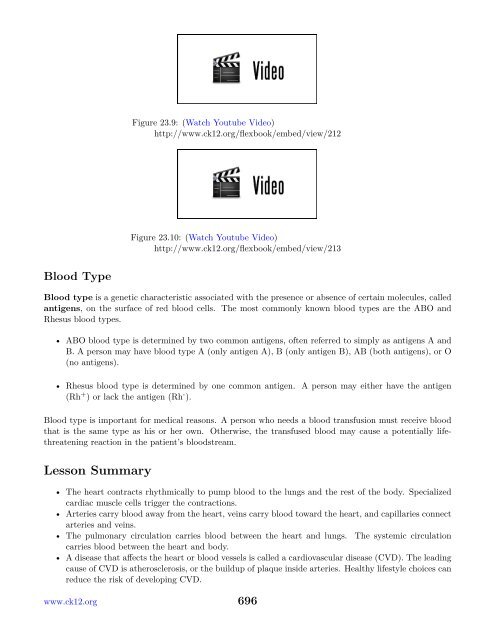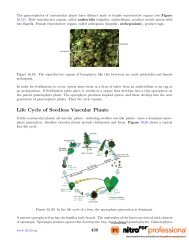Chapter 23 The Circulatory, Respiratory, Digestive, and Excretory ...
Chapter 23 The Circulatory, Respiratory, Digestive, and Excretory ...
Chapter 23 The Circulatory, Respiratory, Digestive, and Excretory ...
You also want an ePaper? Increase the reach of your titles
YUMPU automatically turns print PDFs into web optimized ePapers that Google loves.
Blood Type<br />
Figure <strong>23</strong>.9: (Watch Youtube Video)<br />
http://www.ck12.org/flexbook/embed/view/212<br />
Figure <strong>23</strong>.10: (Watch Youtube Video)<br />
http://www.ck12.org/flexbook/embed/view/213<br />
Blood type is a genetic characteristic associated with the presence or absence of certain molecules, called<br />
antigens, on the surface of red blood cells. <strong>The</strong> most commonly known blood types are the ABO <strong>and</strong><br />
Rhesus blood types.<br />
• ABO blood type is determined by two common antigens, often referred to simply as antigens A <strong>and</strong><br />
B. A person may have blood type A (only antigen A), B (only antigen B), AB (both antigens), or O<br />
(no antigens).<br />
• Rhesus blood type is determined by one common antigen. A person may either have the antigen<br />
(Rh + ) or lack the antigen (Rh - ).<br />
Blood type is important for medical reasons. A person who needs a blood transfusion must receive blood<br />
that is the same type as his or her own. Otherwise, the transfused blood may cause a potentially lifethreatening<br />
reaction in the patient’s bloodstream.<br />
Lesson Summary<br />
• <strong>The</strong> heart contracts rhythmically to pump blood to the lungs <strong>and</strong> the rest of the body. Specialized<br />
cardiac muscle cells trigger the contractions.<br />
• Arteries carry blood away from the heart, veins carry blood toward the heart, <strong>and</strong> capillaries connect<br />
arteries <strong>and</strong> veins.<br />
• <strong>The</strong> pulmonary circulation carries blood between the heart <strong>and</strong> lungs. <strong>The</strong> systemic circulation<br />
carries blood between the heart <strong>and</strong> body.<br />
• A disease that affects the heart or blood vessels is called a cardiovascular disease (CVD). <strong>The</strong> leading<br />
cause of CVD is atherosclerosis, or the buildup of plaque inside arteries. Healthy lifestyle choices can<br />
reduce the risk of developing CVD.<br />
www.ck12.org 696





